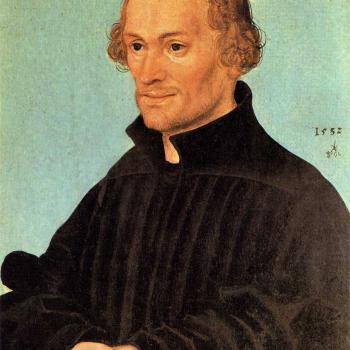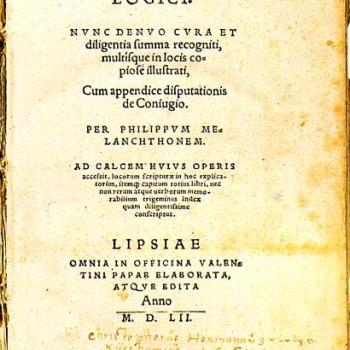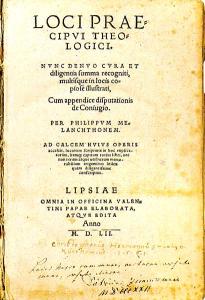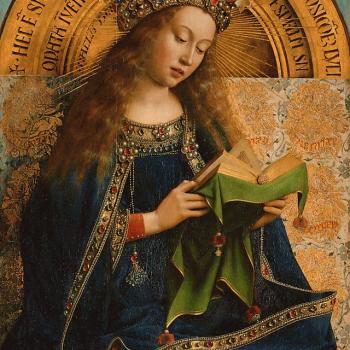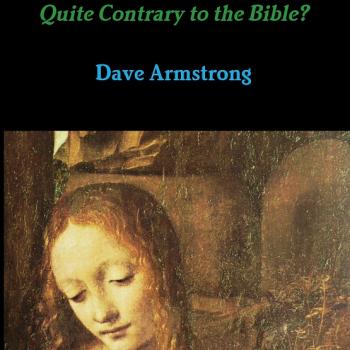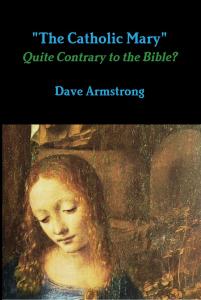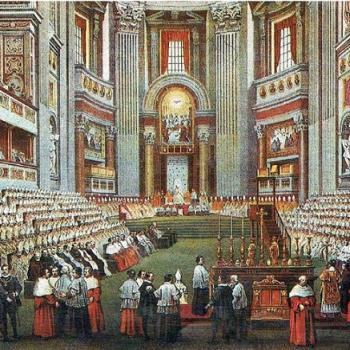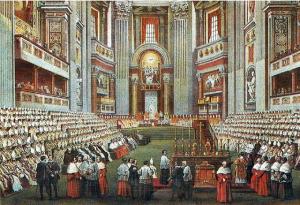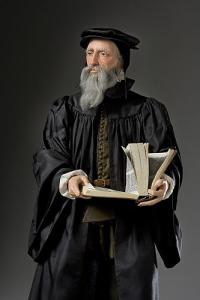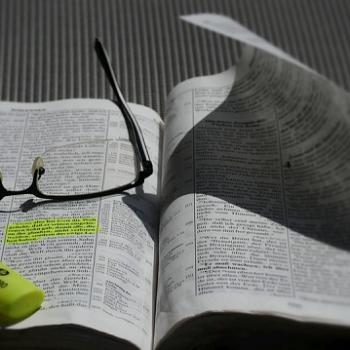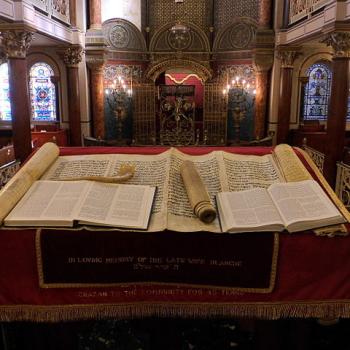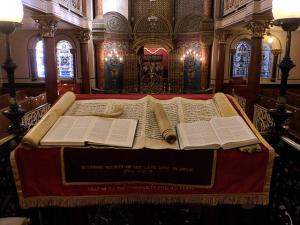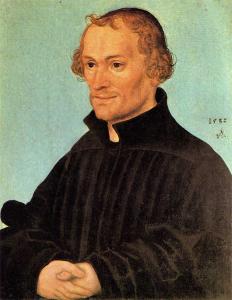
Luther, who had some violent disagreements with him, never criticized him publicly and never really broke with him. In fact, the verdict of history is that Luther was kinder to Melanchthon than Melanchthon was to Luther. . . . Most Lutherans in America up to the present time have been critical of him, including Schmauck, Neve, Bente, Pelikan, and many others, although that attitude is changing somewhat. (p. 7)*Melanchthon was a prodigy. He entered Heidelberg University at twelve and received his bachelor’s degree at 14. He moved on to Tubingen, where he earned the master’s degree at 17, . . . He never received the doctorate and was never ordained into the ministry. He never preached from the pulpit, although he had much to do with the development of the study of oratory and homiletics. He received an appointment to teach at the newly established University of Wittenberg in 1518. . . . He remained at Wittenberg the rest of his life . . . differences [with Luther] appear as early as 1530, . . . and become more evident as the years roll on. (p. 8)
1 Corinthians 15:10 But by the grace of God I am what I am, and his grace toward me was not in vain. On the contrary, I worked harder than any of them, though it was not I, but the grace of God which is with me.*1 Corinthians 3:9 For we are God’s fellow workers . . .*2 Corinthians 6:1 Working together with him, . . .*Philippians 2:13 for God is at work in you, both to will and to work for his good pleasure.*Colossians 1:29 . . . I toil, striving with all the energy which he mightily inspires within me.*Mark 16:20 And they went forth and preached everywhere, while the Lord worked with them . . .
Philippians 2:12 . . . work out your own salvation with fear and trembling;*1 Timothy 5:22 . . . keep yourself pure.*2 Timothy 2:15, 21 Do your best to present yourself to God as one approved, . . . [21] If any one purifies himself from what is ignoble, then he will be a vessel for noble use, consecrated and useful to the master of the house, ready for any good work.*2 Peter 1:10 Therefore, brethren, be the more zealous to confirm your call and election, for if you do this you will never fall;*Jude 20-21 But you, beloved, build yourselves up on your most holy faith; pray in the Holy Spirit; [21] keep yourselves in the love of God;
It is evident that godly minds are tormented and also hopeful that their obedience may be pleasing to God, but in this terrible weakness of ours they see that our obedience is crippled, impeded, imperfect, corrupt, . . . (p. 99)
Sometimes it is (we being fallen human beings who fail even after regeneration); most times it is not, if we are being obedient (the very act of which indicates a preceding grace). The seven representative passages above show not the slightest hint of the efforts and works done being “crippled, impeded, imperfect, corrupt.” That’s simply Protestant “faith alone”: being improperly superimposed onto the Bible. I submit that Melanchthon’s and Protestants’ prior presuppositions or worldview trump what the Bible actually teaches (which I think I am showing as I move along).
The hypocrites think that they do satisfy the Law, that they are righteous, that is, that they have been accepted by God because of their own worthiness or their fulfillment of the Law, as the Pharisee says in Luke 18:9-12. (p. 99)
That’s supposedly us dumb, deluded Catholics, of course! This is the old tired caricature of Catholicism as works-salvation (a thing we had roundly condemned 1100 years before Melanchthon): equating it with the Pharisees and Judaizers. The silliness and wrongheadedness of this charge — in terms of what Catholics actually teach and believe and seek to practice — is seen in the Decree on Justification from the Council of Trent, from its Sixth Session on 13 January 1547: less than four years after the third edition of Loci Communes that I am critiquing, was published, and thirteen years before Melanchthon died:
CHAPTER I. On the Inability of Nature and of the Law to justify man.
The holy Synod declares first, that, for the correct and sound understanding of the doctrine of Justification, it is necessary that each one recognise and confess, that, whereas all men had lost their innocence in the prevarication of Adam-having become unclean, and, as the apostle says, by nature children of wrath, as (this Synod) has set forth in the decree on original sin,-they were so far the servants of sin, and under the power of the devil and of death, that not the Gentiles only by the force of nature, but not even the Jews by the very letter itself of the law of Moses, were able to be liberated, or to arise, therefrom; although free will, attenuated as it was in its powers, and bent down, was by no means extinguished in them.
Thus we see that actual magisterial Church teaching, reiterated and promulgated during Melanchthon’s lifetime, is the polar opposite of his ridiculous caricature (that is still widely used to this day). The first three canons on justification from the same document, are so in line with Protestant teaching, that John Calvin, in his work, Acts of the Council of Trent with the Antidote (21 November 1547) — which I wrote about it in one article –, completely agreed with them and offered no further comment (writing, “To Canons 1, 2, and 3:, I say, Amen.”):
CANON I.-If any one saith, that man may be justified before God by his own works, whether done through the teaching of human nature, or that of the law, without the grace of God through Jesus Christ; let him be anathema.
CANON II.-If any one saith, that the grace of God, through Jesus Christ, is given only for this, that man may be able more easily to live justly, and to merit eternal life, as if, by free will without grace, he were able to do both, though hardly indeed and with difficulty; let him be anathema.
CANON III.-If any one saith, that without the prevenient inspiration of the Holy Ghost, and without his help, man can believe, hope, love, or be penitent as he ought, so as that the grace of Justification may be bestowed upon him; let him be anathema.
Here are some more good ones that any Protestant ought to readily agree with:
CANON X.-If any one saith, that men are just without the justice of Christ, whereby He merited for us to be justified; or that it is by that justice itself that they are formally just; let him be anathema.
CHAPTER V. On the necessity, in adults, of preparation for Justification, and whence it proceeds.
. . . the beginning of the said justification is to be derived from the prevenient grace of God through Jesus Christ . . . without any merits existing on their parts . . . yet is he not able, by his own free-will, without the grace of God, to move himself into justice in His sight . . .
CHAPTER VIII. In what manner it is to be understood, that the impious is justified by faith, and gratuitously.
. . . none of those things which precede justification — whether faith or works — merit the grace itself of justification. For if it be a grace, it is not now by works; otherwise, as the same Apostle says, grace is no more grace.
There are always people like this who admire their own virtues, who give long tributes to their own wisdom and righteousness, especially in secondary matters which are showy, which they think they can govern by their own ideas and which they choose to accept as the divinely given fruits of their own virtues and diligence, . . . (p. 99)
This is the picture which many hypocrites project, and there are not a few who are like this, self-confident, pleased with them selves because of their gifts, applauding their own wisdom, . . . (p. 100)
I guess he is talking about David and Paul, too:
1 Samuel 26:23 [David] The LORD rewards every man for his righteousness and his faithfulness; . . .
2 Samuel 22:21-25 [David] The LORD rewarded me according to my righteousness; according to the cleanness of my hands he recompensed me. [22] For I have kept the ways of the LORD, and have not wickedly departed from my God.
Romans 15:17 . . . In Christ Jesus, then, I have reason to be proud of my work for God.
2 Timothy 4:6-8 For I am already on the point of being sacrificed; the time of my departure has come. [7] I have fought the good fight, I have finished the race, I have kept the faith. [8] Henceforth there is laid up for me the crown of righteousness, which the Lord, the righteous judge, will award to me on that Day, . . .
“Please Hit ‘Subscribe’”! If you have received benefit from this or any of my other 4,800+ articles, please follow my blog by signing up (with your email address) on the sidebar to the right (you may have to scroll down a bit), above where there is an icon bar, “Sign Me Up!”: to receive notice when I post a new blog article. This is the equivalent of subscribing to a YouTube channel. My blog was rated #1 for Christian sites by leading AI tool, ChatGPT: endorsed by influential Protestant blogger Adrian Warnock. Please also consider following me on Twitter / X and purchasing one or more of my 55 books. All of this helps me get more exposure, and (however little!) more income for my full-time apologetics work. Thanks so much and happy reading!
***
In fact, St. Paul was in several instances in his letters, given to long glowing descriptions of his own [God-enabled] righteous works and sanctity (I guess Melanchthon would consign him to the proud, arrogant, Pharisee-types, too, huh?):
2 Corinthians 11:5-30 I think that I am not in the least inferior to these superlative apostles. [6] Even if I am unskilled in speaking, I am not in knowledge; in every way we have made this plain to you in all things. [7] Did I commit a sin in abasing myself so that you might be exalted, because I preached God’s gospel without cost to you? [8] I robbed other churches by accepting support from them in order to serve you. [9] And when I was with you and was in want, I did not burden any one, for my needs were supplied by the brethren who came from Macedo’nia. So I refrained and will refrain from burdening you in any way. [10] As the truth of Christ is in me, this boast of mine shall not be silenced in the regions of Acha’ia. [11] And why? Because I do not love you? God knows I do! [12] And what I do I will continue to do, in order to undermine the claim of those who would like to claim that in their boasted mission they work on the same terms as we do. [13] For such men are false apostles, deceitful workmen, disguising themselves as apostles of Christ. [14] And no wonder, for even Satan disguises himself as an angel of light. [15] So it is not strange if his servants also disguise themselves as servants of righteousness. Their end will correspond to their deeds. [16] I repeat, let no one think me foolish; but even if you do, accept me as a fool, so that I too may boast a little. [17] (What I am saying I say not with the Lord’s authority but as a fool, in this boastful confidence; [18] since many boast of worldly things, I too will boast.) [19] For you gladly bear with fools, being wise yourselves! [20] For you bear it if a man makes slaves of you, or preys upon you, or takes advantage of you, or puts on airs, or strikes you in the face. [21] To my shame, I must say, we were too weak for that! But whatever any one dares to boast of — I am speaking as a fool — I also dare to boast of that. [22] Are they Hebrews? So am I. Are they Israelites? So am I. Are they descendants of Abraham? So am I. [23] Are they servants of Christ? I am a better one — I am talking like a madman — with far greater labors, far more imprisonments, with countless beatings, and often near death. [24] Five times I have received at the hands of the Jews the forty lashes less one. [25] Three times I have been beaten with rods; once I was stoned. Three times I have been shipwrecked; a night and a day I have been adrift at sea; [26] on frequent journeys, in danger from rivers, danger from robbers, danger from my own people, danger from Gentiles, danger in the city, danger in the wilderness, danger at sea, danger from false brethren; [27] in toil and hardship, through many a sleepless night, in hunger and thirst, often without food, in cold and exposure. [28] And, apart from other things, there is the daily pressure upon me of my anxiety for all the churches. [29] Who is weak, and I am not weak? Who is made to fall, and I am not indignant? [30] If I must boast, I will boast of the things that show my weakness.
1 Corinthians 9:14-19 In the same way, the Lord commanded that those who proclaim the gospel should get their living by the gospel. [15] But I have made no use of any of these rights, nor am I writing this to secure any such provision. For I would rather die than have any one deprive me of my ground for boasting. [16] For if I preach the gospel, that gives me no ground for boasting. For necessity is laid upon me. Woe to me if I do not preach the gospel! [17] For if I do this of my own will, I have a reward; but if not of my own will, I am entrusted with a commission. [18] What then is my reward? Just this: that in my preaching I may make the gospel free of charge, not making full use of my right in the gospel. [19] For though I am free from all men, I have made myself a slave to all, that I might win the more.
2 Corinthians 1:5-14 For as we share abundantly in Christ’s sufferings, so through Christ we share abundantly in comfort too. [6] If we are afflicted, it is for your comfort and salvation; and if we are comforted, it is for your comfort, which you experience when you patiently endure the same sufferings that we suffer. [7] Our hope for you is unshaken; for we know that as you share in our sufferings, you will also share in our comfort. [8] For we do not want you to be ignorant, brethren, of the affliction we experienced in Asia; for we were so utterly, unbearably crushed that we despaired of life itself. [9] Why, we felt that we had received the sentence of death; but that was to make us rely not on ourselves but on God who raises the dead; [10] he delivered us from so deadly a peril, and he will deliver us; on him we have set our hope that he will deliver us again. [11] You also must help us by prayer, so that many will give thanks on our behalf for the blessing granted us in answer to many prayers. [12] For our boast is this, the testimony of our conscience that we have behaved in the world, and still more toward you, with holiness and godly sincerity, not by earthly wisdom but by the grace of God. [13] For we write you nothing but what you can read and understand; I hope you will understand fully, [14] as you have understood in part, that you can be proud of us as we can be of you, on the day of the Lord Jesus.
Colossians 1:24-28 Now I rejoice in my sufferings for your sake, and in my flesh I complete what is lacking in Christ’s afflictions for the sake of his body, that is, the church, [25] of which I became a minister according to the divine office which was given to me for you, to make the word of God fully known, [26] the mystery hidden for ages and generations but now made manifest to his saints. [27] To them God chose to make known how great among the Gentiles are the riches of the glory of this mystery, which is Christ in you, the hope of glory. [28] Him we proclaim, . . .
Yes, of course in 2 Corinthians 11, it is partly sarcastic (this boast of mine”; “I am talking like a madman” etc.), but he goes on and on, and sarcasm (in Paul or Jesus or anyone else who uses it) always has an underlying serious point to make. If indeed, Paul could take no credit at all for any or all of this (the Protestant denial of merit), then the whole discourse is most improper and inappropriate. Moreover, he also uses “boast” in a totally non-sarcastic way in 1 Corinthians 9 and 2 Corinthians 1.
Therefore they tout themselves above others because of their wisdom and righteousness, as Nebuchadnezzar did, . . . (p. 99)
Paul certainly did so above. He had none of Luther’s existential angst and cyclical insecurity about his standing before God. Melanchthon, a timid, nervous type to begin with, seems to have inherited that from Luther. Unfortunately, they both passed on their personal insecurities and struggles into mainstream Protestant soteriology (theology of salvation), so that they became institutionalized. Personally, I suspect that it’s more psychological stuff than theological or biblical . . .
But even before psychology enters in, the root of it is arguably the Protestant leading trait of creating illogical “either/or” false dichotomies. Louis Bouyer, a Lutheran who became a Catholic, wrote an entire brilliant book about this, called The Spirit and Forms of Protestantism. I recommend it more highly than any other book, for Catholics desiring to understand the premises and presuppositions of Protestantism.
Likewise Saul believed that the kingdom of Israel had been established by his power, although he should have known that both this power and the successes were blessings from God, and that he could not have accomplished or ruled over such things by himself, . . . (p. 100)
That’s exactly my point: both as regards biblical teaching and the fact that Catholics agree with it in this respect and every other. Protestants aren’t the only ones who teach salvation by grace alone, God’s providence and sovereignty, predestination, election, the wrongness of works-salvation, etc. This may come as a shock to many, but so be it. I’m here to educate and proclaim what I strongly believe to be the truth, not please (i.e., when the two differ from each other).
But first of all we must establish this point: Although in the regenerate there must be a beginning of obedience and the righteousness of a good conscience, yet sins still remain in them, that is to say, the disease which is born in us, the doubts, the ignorance of many things; or in other words, that they do not fear God as they ought nor burn with love toward Him as the Law demands. (p. 100)
That’s self-evident in the Bible, and the Catholic Church had always taught it, so I fail to see why Melanchthon thought he needed to “establish” it (with whom?: biblical illiterates or completely uncatechized folks?). Odd . . . :
Psalm 130:3-4 If thou, O LORD, shouldst mark iniquities, Lord, who could stand? [4] But there is forgiveness with thee, . . . (130:3 was cited by Melanchthon on p. 101; mistakenly identified as “103:3” by either him or translator Preuss)
Matthew 6:14-15 For if you forgive men their trespasses, your heavenly Father also will forgive you; [15] but if you do not forgive men their trespasses, neither will your Father forgive your trespasses.
John 8:7 . . . “Let him who is without sin among you be the first to throw a stone at her.”
James 5:15-16 . . . if he has committed sins, he will be forgiven. [16] Therefore confess your sins to one another, . . .
1 John 1:8-10 If we say we have no sin, we deceive ourselves, and the truth is not in us. [9] If we confess our sins, he is faithful and just, and will forgive our sins and cleanse us from all unrighteousness. [10] If we say we have not sinned, we make him a liar, and his word is not in us. (1:8 was cited by Melanchthon later on the same page: 100).
1 John 2:1 My little children, I am writing this to you so that you may not sin; but if any one does sin, we have an advocate with the Father, Jesus Christ the righteous;
The monks even teach that these doubts concerning providence, the wrath of God, His mercy, our wicked desires, unless there is consent to them, are not sins; . . . (p. 100)
The key word there is “consent.” He is writing about concupiscence here. See my articles, Augsburg Confession Dialogues: God / Original Sin (Agreement Regarding God’s Nature, But Differences Concerning the Rule of Faith & Concupiscence) [5-2-24] and Calvinist Total Depravity vs. Catholic Concupiscence [1996].
. . . sin remains in this mortal nature of ours. (p. 100)
No one is disagreeing, so again, I don’t know who it is that Melanchthon fancies would disagree with this. Catholics simply say that one can become holier and holier and more righteous over time, by God’s grace and our resolve, discipline, and free will choices. Theoretically, we could arrive at a sinless state of being, but as we all know, it virtually never happens. We all strive, or should at least desire to strive, with God’s help, to live as free from sin as we can. At the moment of baptism, we are at least momentarily sinless, since all of our old sins have been forgiven and we have been regenerated and born again.
Rom. 7:23, “I see another law at work in my members waging war against the law of my mind and making me a prisoner to the law of sin which is in my members.” Now, although the sophists get around this passage and say that . . . here the word refers to . . . the tendency to sin which has come from the fall of our first parents [concupiscence], yet Paul himself refutes this sophistry in his definition of sin itself, when he says that it is an evil in our members which is at war with the law of God.
Furthermore, we have discussed in regard to this article whether the wickedness which remains in our nature is something which is in conflict with the law of God. Human judgment excuses this corruption, but Paul uses very graphic words to describe this terrible thing. He says that the corruption is at war in his members, that it is viciously contending against the law of his mind, confirming his carnal security or his righteous ness which is at odds with God, filling his mind with pride in his own virtues and arrogance, kindling lusts, hatred, desire for revenge, and urging him to seek for bidden help; and finally it takes him captive, because it overthrows the antagonisms of his mind by fears and brings him to the point of despair, so that he flees from God. aw at work in my members waging war against the law of my mind and making me a prisoner to the law of sin which is in my members.” Now, although the sophists get around this passage and say that there has been a shift in the word “sin,” and that here the word refers to “the punishment of sin,” the tendency to sin which has come from the fall of our first parents, yet Paul himself refutes this sophistry in his definition of sin itself, when he says that it is an evil in our members which is at war with the law of God. (p. 100)
Dom Bernard Orchard, in his Catholic Commentary (1953) writes about Romans 7:
It is characteristic of this and the following paragraph, 13–25, that St Paul argues in the first person. The natural conclusion is that he relates his own experience. On the other hand, to argue from a purely individual experience is out of place in such a general discussion as is developed in Rom. This forces upon us the further conclusion that Paul regarded his own experience in this case as typical. And since he speaks in the past, obviously referring to the time before baptism, it can be further described as typical of the pre-Christian time. Then the question arises whether it is to be considered as a typical experience of Israelites and Gentiles alike or only of the former. The answers differ. All who limit the theme of Rom 7 to a discussion on the Mosaic Law must limit the typical value of Paul’s experience accordingly because it is the basis of the whole argument. On the other hand, Rom is addressed to a Christian community consisting of former Israelites as well as of former Gentiles (cf. 1:18–3, 20) and there is no evidence that in our chapter Paul is speaking to the former Israelites only. In view of the addressees, therefore, it seems more natural to think that he looked upon his own experience in the matter as generally typical of the time before becoming a Christian without distinguishing between former Israelites and Gentiles.
The law of which St Paul speaks here has been identified with the natural moral law, the Mosaic Law, and both together. The last is the most satisfactory answer. That he foremost had the Mosaic Law in mind follows from the fact that he speaks in the first person. At the same time he must have included the natural moral law because of the former Gentiles among his readers. The simplest solution therefore is to take the law here as the Mosaic Law but as typical of the natural moral law in the same sense as the first person in this description is meant to be typical of man in general, Israelite and Gentile alike. This wider interpretation of ‘law’ is not contradicted by the commandment ‘Thou shalt not covet’, 7. No doubt this is a quotation from the Decalogue. But the quotation is so free (cf. Ex 20:17; Deut 5:21) that it fits the natural moral law as well. Nor can it be urged against this explanation that it entails the abrogation of the natural law which is clearly against Christian doctrine. The point of the whole chapter is not the abrogation of the law, but ‘who is to be given first place’, Christ or — as it has been heretofore — the law? . . .
Modern commentators agree that both context and contents point decisively to the time before conversion. It is the characteristic experience of the soul before conversion to the Christian faith to be ‘sold under sin’, 14, and to be unable to carry out its higher aspirations, 15, 18, 23, 25b. To regard this experience as remaining after conversion is against the whole line of the argument, cf. 6:6, 9, 12–14, 17, 22; 7:6; 8; and also against all the moral exhortations in St Paul’s epistle. Nor is it necessary to understand the picture as a reflexion of the Apostle’s own state of soul when writing because he uses the present tense. There is no reason against taking this as an historic or graphic present to denote what is past, so that there is no real change of tense between 7–12 and 13–25. (my italics)
Romans 8 is Paul’s “treatise” on what the spiritual life is like after regeneration. Paul didn’t have two personalities. Nor was he self-contradictory. The topic of Romans 7 is the pre-regenerate or pagan / carnal life, whereas Romans 8 is about the Christian life, which he was experiencing (and all of us can, too):
Romans 8:1-3, 6 There is therefore now no condemnation for those who are in Christ Jesus. [2] For the law of the Spirit of life in Christ Jesus has set me free from the law of sin and death. [3] For God has done what the law, weakened by the flesh, could not do: . . . [6] To set the mind on the flesh is death, but to set the mind on the Spirit is life and peace.
Romans 8:26-28 Likewise the Spirit helps us in our weakness; for we do not know how to pray as we ought, but the Spirit himself intercedes for us with sighs too deep for words. [27] And he who searches the hearts of men knows what is the mind of the Spirit, because the Spirit intercedes for the saints according to the will of God. [28] We know that in everything God works for good with those who love him, who are called according to his purpose. (8:28 is my favorite verse in the Bible).
Romans 8:37 No, in all these things we are more than conquerors through him who loved us.
Melanchthon, on the other hand, wants to take Romans 7 as descriptive of the life of every Christian (even Paul’s!): supposedly miserably and utterly unable to overcome sin, as if there were no Romans 8 to follow it and provide the solution to Paul’s rhetorical spiritual dilemma, laid out in chapter 7. It’s classic isolated proof-texting, which is sadly common in Protestant theology and apologetics, especially when deliberately trying to refute Catholicism. St. Paul in Romans 8 isn’t arguing that we are beyond sin (as if it poses no difficulties at all), but rather, that we can always conquer it, provided we cooperate with God the Holy Spirit, Who lives within us (8:9-11; cf. John 14-16). That’s why it’s such a jubilant, triumphalistic, joyous, sunny chapter.
This gets to the heart of the “Reformation” debate over justification: does it actually change us for the better (Catholicism), or is it a mere declaration, with any actual righteousness neatly separated into a separate non-salvific “box” of sanctification (Protestantism)? As Protestant scholars like Alister McGrath and Norman Geisler tell us, the latter notion wasn’t taught by the Church fathers (especially not by St. Augustine), and Melanchthon introduced it fifteen centuries after Christ; in effect making out that no one had ever understood this until he did. I also add that our view has the support of the Bible, as I think I have demonstrated here and in scores and scores of other articles collected on my Salvation, Justification, & “Faith Alone” web page (see especially the first section). I habitually provide much more biblical argumentation than my theological opponents do. Melanchthon is no exception.
Therefore, although sins are present with us and the godly to some degree recognize the wrath of God, yet they believe that they are pleasing to God because of His promised mercy, and they sustain themselves with this comfort, as Ps. 33:20 ff. says, “My soul sustains itself in His Word … my soul hopes in the Lord, for with the Lord there is mercy”; Ps. 32:5-6, . . . (p. 101; he provides several more biblical examples of that)
That’s necessary, given our fallen nature prior to regeneration, but in the Bible there are also many examples of God being “pleased” because of what regenerate believers obediently do in His power and grace (which is precisely why He rewards us for same, which is Catholic merit: vigorously and categorically denied by Protestantism). Yet here it is massively in the Bible (“ya pays yer money and ya makes yer choice”):
Genesis 18:19 I have chosen him, that he may charge his children and his household after him to keep the way of the LORD by doing righteousness and justice; so that the LORD may bring to Abraham what he has promised him.
Genesis 22:16-17 “By myself I have sworn, says the LORD, because you have done this, and have not withheld your son, your only son, [17] I will indeed bless you, and I will multiply your descendants as the stars of heaven and as the sand which is on the seashore. . . .
1 Samuel 26:23 The LORD rewards every man for his righteousness and his faithfulness; . . .
2 Samuel 22:21-25 The LORD rewarded me according to my righteousness; according to the cleanness of my hands he recompensed me. [22] For I have kept the ways of the LORD, and have not wickedly departed from my God. [23] For all his ordinances were before me, and from his statutes I did not turn aside. [24] I was blameless before him, and I kept myself from guilt. [25] Therefore the LORD has recompensed me according to my righteousness, according to my cleanness in his sight. (cf. Ps 18:20-23)
1 Kings 3:9-14 Give thy servant therefore an understanding mind to govern thy people, that I may discern between good and evil; for who is able to govern this thy great people?” [10] It pleased the Lord that Solomon had asked this. [11] And God said to him, “Because you have asked this, and have not asked for yourself long life or riches or the life of your enemies, but have asked for yourself understanding to discern what is right, [12] behold, I now do according to your word. Behold, I give you a wise and discerning mind, so that none like you has been before you and none like you shall arise after you. [13] I give you also what you have not asked, both riches and honor, so that no other king shall compare with you, all your days. [14] And if you will walk in my ways, keeping my statutes and my commandments, as your father David walked, then I will lengthen your days.”
Proverbs 15:26 The thoughts of the wicked are an abomination to the LORD, the words of the pure are pleasing to him.
Jeremiah 31:16 . . . your work shall be rewarded, says the LORD, . . .
Jeremiah 32:19 great in counsel and mighty in deed; whose eyes are open to all the ways of men, rewarding every man according to his ways and according to the fruit of his doings;
Haggai 1:8 Go up to the hills and bring wood and build the house, that I may take pleasure in it and that I may appear in my glory, says the LORD.
Matthew 6:3-4 But when you give alms, do not let your left hand know what your right hand is doing, [4] so that your alms may be in secret; and your Father who sees in secret will reward you. . . . (cf. 6:6, 17-18, 20)
Mark 10:29-30 Jesus said, “Truly, I say to you, there is no one who has left house or brothers or sisters or mother or father or children or lands, for my sake and for the gospel, [30] who will not receive a hundredfold now in this time, houses and brothers and sisters and mothers and children and lands, . . .
Ephesians 5:10 and try to learn what is pleasing to the Lord. (cf. Phil 2:13)
Ephesians 6:8 knowing that whatever good any one does, he will receive the same again from the Lord, . . .
Philippians 4:18 I have received full payment, and more; I am filled, having received from Epaphrodi’tus the gifts you sent, a fragrant offering, a sacrifice acceptable and pleasing to God.
Colossians 1:10 to lead a life worthy of the Lord, fully pleasing to him, . . .
Colossians 3:20 Children, obey your parents in everything, for this pleases the Lord.
1 Thessalonians 2:4 but just as we have been approved by God to be entrusted with the gospel, so we speak, not to please men, but to please God who tests our hearts.
1 Thessalonians 4:1 Finally, brethren, we beseech and exhort you in the Lord Jesus, that as you learned from us how you ought to live and to please God, just as you are doing, you do so more and more.
Hebrews 13:16 Do not neglect to do good and to share what you have, for such sacrifices are pleasing to God.
1 John 3:22 and we receive from him whatever we ask, because we keep his commandments and do what pleases him.
Daniel teaches the same thing for which Paul so copiously contends, when he says that we understand that the nature of man is wicked and does not satisfy the Law, but that we are accepted by God through His mercy for the sake of the promised Lord. (p. 101)
That’s only part of the whole picture, as I just proved. Melanchthon, in classic Protestant style, completely ignores a prominent biblical motif, while pretending that the partial truth he presents is the whole picture. There is a reason why we swear in courts to tell “the truth, the whole truth, and nothing but the truth.” Later, Melanchthon acknowledges that we can do things that are pleasing to God:
It is necessary to possess the good righteousness of a good conscience and to know how it pleases God. . . . obedience is pleasing to God, . . . (pp. 101-102)
But he can’t admit that this is essentially the same thing as what Catholics call merit, because Luther and Protestantism arbitrarily, irrationally, and unbiblically decided that it doesn’t exist. In another paper, I provided 46 biblical passages proving that it does.
In 1 Cor. 1:31, “He who glories, let him glory in the Lord,” that is, we cannot be glorified or exalted because we are without sin, but we glory in the Lord, that is to say, in the Lord who promises us mercy. (p. 101)
This is another partial truth. Many biblical passages (I found 26 myself) teach that God shares His glory with us. Why is it that Melanchthon, a Bible scholar, didn’t know this; nor does he seem familiar with many other biblical themes I am pointing out? Or did he indeed know, but wanted to conceal them and engage in consciously selective presentation?
In Col. 1:28 it says, “You are presented perfect in Christ Jesus,” that is, even if the regenerate do not yet fulfill the Law, yet they are righteous and pleasing to God for the sake of His Son. Here we should confess and celebrate the fulness of the mercy of God, that in those who have been reconciled, this obedience which is incomplete, imperfect, unclean, and corrupted by many wicked desires, is still accepted by God, not in deed because of the worth of our virtues but because of the Son of God, Rom. 6:14, “You are not under the Law but under grace.” (p. 102)
Melanchthon seeks to force-fit this verse into Protestant forensic, external, imputed justification. To do so, he made out that it is referring to a completed event. But my RSV reads, “that we may present every man mature in Christ.” Then Paul immediately adds, “For this I toil, . . . (1:29). How can he “toil” for a thing that is, by definition, God’s work alone? “May” is present in virtually every English translation of Colossians 1:28. But in any event (whatever the Greek tense is), Paul couldn’t “toil” for imputed justification (even in the temporary sense in which Catholics accept it). He would have nothing to do with it.
Paul also expressly denies what Melanchthon seeks to assert: “Not that I . . . am already perfect . . . I press on toward the goal . . .” (Phil 3:12, 14). This is the Catholic striving for actual holiness, not a one-time instant declaration that we are holy in God’s sight, when in fact we aren’t. Forgiveness of sins and reconciliation — which we receive in baptism and initial justification — are not the same thing as being perfectly holy: although we temporarily are that after baptism until the next sin we commit. Catholic and Protestantism happily “meet” in what we call initial justification, but then it immediately diverges again when it comes to considering what happens after that, for the rest of the person’s life.
*
*
*
***
*


